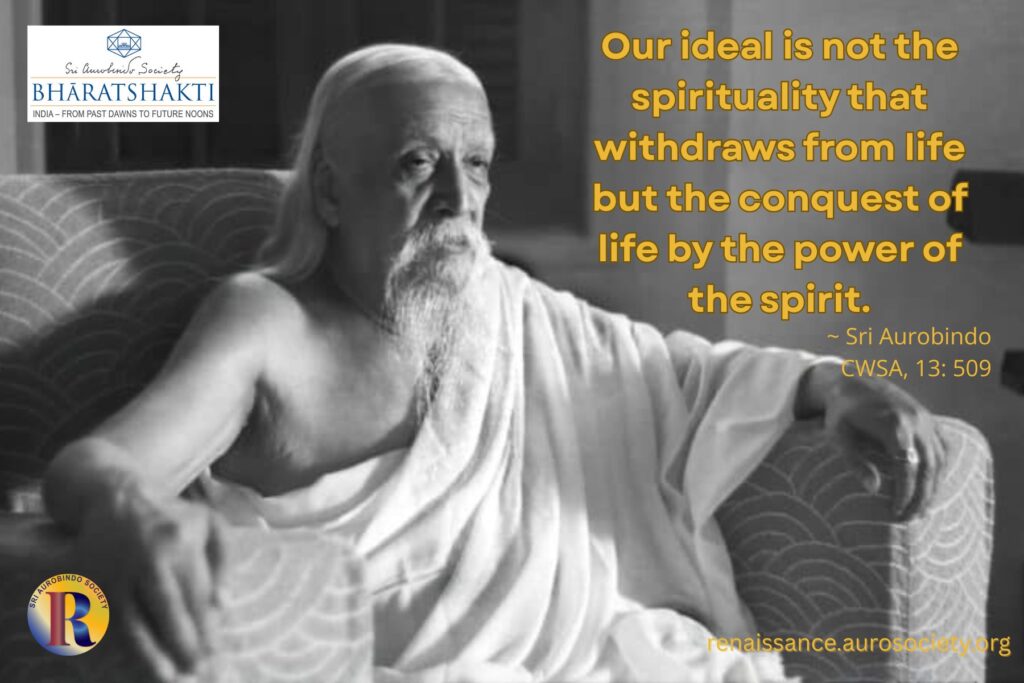After taking up themes on Conscious Parenting, Education, Work, Human Relations, Money, Religion, and Literature, we now take up the theme of Food, Sleep and Yoga in our All Life is Yoga series. Curating and editing this issue has been an especially joyful work because of the numerous possibilities this theme offered to share and express what we were learning. This work has also served as important reminder for our team in many practical ways.
But before I give below a preview of the offerings in this issue, I share a memoir written some years ago for my personal blog.


I, the annadevatā, am the first progenitor of yajña: the first yajña was born of me. It is I who, at the earliest times, become the nucleus of amṛta for the devas. The one who gives me is in fact the one who obtains me. On the other hand, the one who does not give is consumed by me. I am the annadevatā, I eat the one who does not give anna.
Taittirīya Brāhmaṇa, 2.8.8.1
Memories of My Annapurna
She would recite, in a very soothing low voice, almost inaudible to others but her, one of her bhajans whenever she was cooking. Or she would be doing her regular japa as she worked in her simple kitchen in her modest home in the big city. Her food tasted heavenly, perhaps because of that.
Everyone who ate even once in her home felt that ‘special’ taste in her food. It was not only their physical hunger that felt satisfied. Something else was being fed too. The real thing within, perhaps.
***
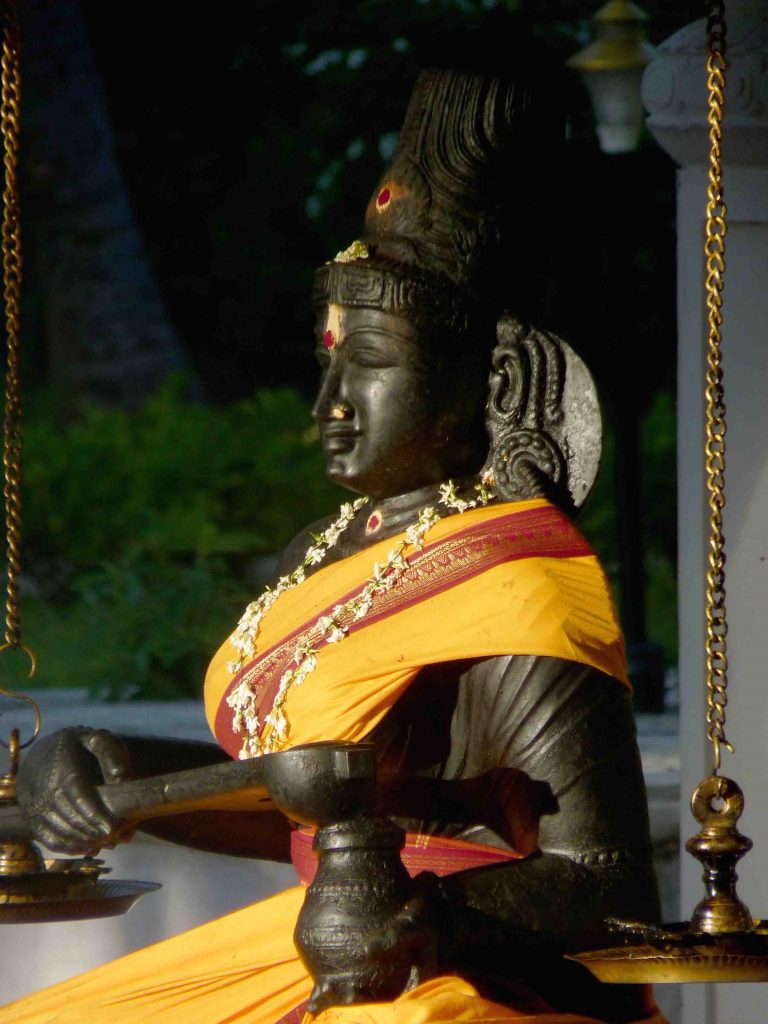
***
She wasn’t into cooking anything gourmet or grand. There were no special recipes that she used. She didn’t use any special spices or ingredients. On the contrary, the food she cooked was very simple, and simply prepared. It was basic, vegetarian, Punjabi food for the most part, and that too without any hot spices.
She never hired any outside help for any task related to cooking. Even when her children were small and needed a lot of attention and looking after, she managed everything herself. This was in addition to her work as a school teacher which she took very seriously. Her husband had some health issues and also needed much care and special attention. She would often need to cook special meals for him. Her lips moving silently in a prayer, she would manage it all by herself.
The house was also frequently filled with extended family members and relatives visiting from other towns. They would often stay for a few days. Or more. She smilingly fed them, made them as comfortable in her modest home as she could. And even packed lunches or home-cooked snacks for them when they went outside for sight-seeing or some other work.
When her children grew up, they helped her whenever they could and to whatever extent they could. Sometimes her children would get upset and ask her why she had to do all that cooking for the guests. Why couldn’t they just stay in a hotel? She would simply smile and say — that is not how it is done. You don’t bother, go and study, I will manage.
As she grew older she began to realize she needed some help in the kitchen, especially when her health started giving her problems. Though by this time the children had moved out of the parental home and the frequency of visiting guests had also reduced, she found herself getting tired frequently. She hired someone to help her with some basic food prep tasks, like chopping of vegetables or kneading the dough etc. The actual preparation of dishes was always done by her. In that same prayerful mood.
Until the very last year of her life. Her failing health would simply not permit her to stand for more than five minutes without any support. And she was compelled to hire someone to cook for herself and her husband.
The children had always visited their parental home, as frequently as grown children do in a close-knit family. Those who lived in other towns would come and even stay with the parents for several days. But when her health started to deteriorate further and the diagnosis revealed a terminal illness, the children would take turns and come to live with her and their father for extended periods of time.
The kitchen was again bursting with activity as children and grand-children frequently visited. But she wasn’t in the kitchen. She was however still very concerned with what was being cooked, and would give detailed instructions, in her frail voice, to the cook regarding how to prepare this dish or that dish. In just a couple of months, despite her failing health she had actually trained the cook to prepare almost everything as per her style.
As the cook would get busy in the kitchen, sitting in the chair in her bedroom she would close her eyes and recite one of her bhajans or do her japa.
The food tasted the same. Almost. And satisfied both the physical and a bit of the other real hunger within.
Where was the magic?
In her hands? In her love for the family? Or in her prayers? Or in all of the above?
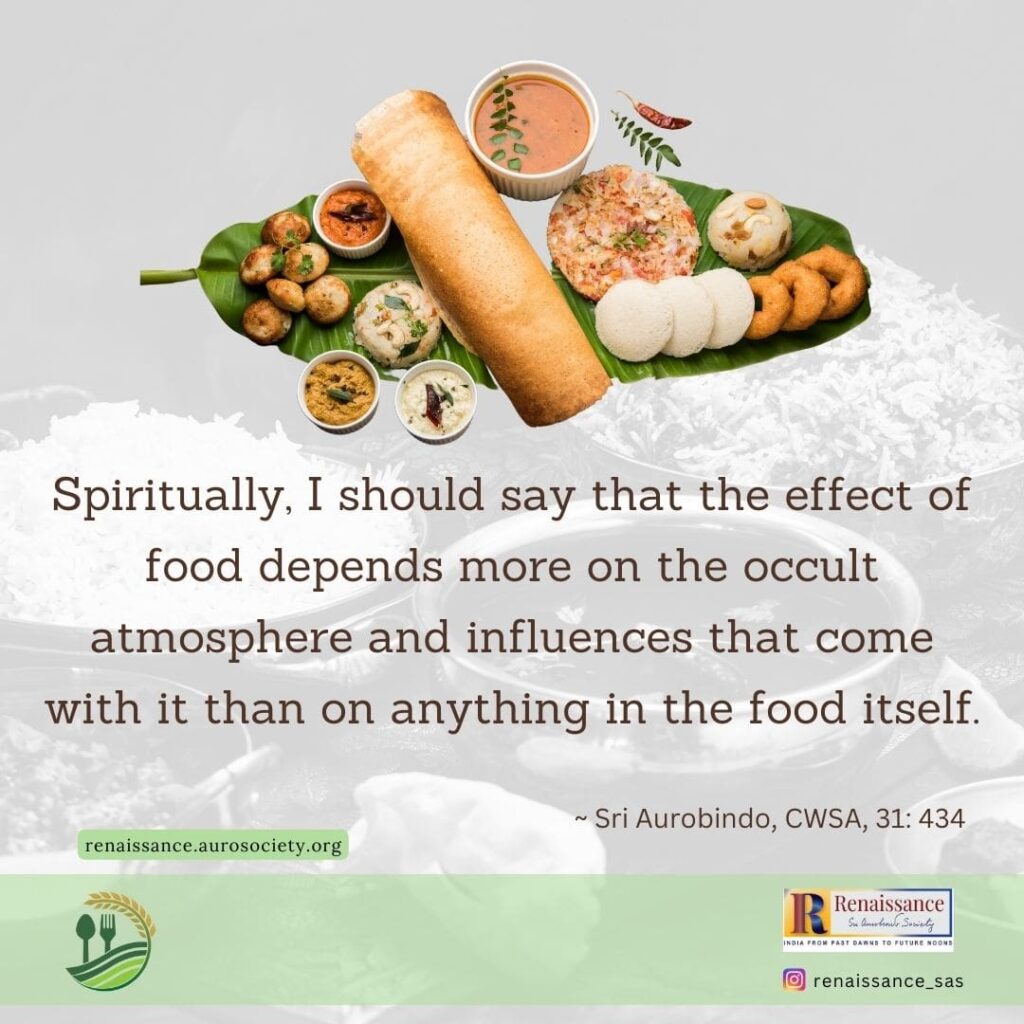
For years after she was gone, the same cook worked in the same kitchen of her home. Cooking for one, her husband. Or for more when the children would visit.
But there would be nobody reciting the prayers, silently, while the cooking was being done.
Or maybe there was. Far, far away. Or very near. Right here. Within.
Within the hearts of her children, her husband, all those who would visit her home and partake of something cooked in her kitchen, where she and her prayers will be present. Always.
Nor spared the labour of broom and jar and well,
~ Sri Aurobindo, Savitri, CWSA, Vol. 34, p. 470
Or close gentle tending or to heap the fire
Of altar and kitchen, no slight task allowed
To others that her woman’s strength might do.
In all her acts a strange divinity shone:
Into a simplest movement she could bring
A oneness with earth’s glowing robe of light,
A lifting up of common acts by love.

I wrote the above some years back in the memory of my mother. It was through her that I first picked up a few things about the impact of inner state of consciousness on food — when one is cooking or eating.
Years later, it was through the numerous letters and conversations of Sri Aurobindo and the Mother, that learning became more impactful because I could connect what I was reading with what I had experienced growing up. The vagueness of what I had picked up almost subconsciously became concrete and conscious.
Though I can’t say that I am always able to put into practice what I have learned about conscious cooking and eating. Perhaps that is case with most aspirants. To truly live the teaching requires strict self-discipline, a constant aspiration and steadfast perseverance – all of which are possible only by the Mother’s Grace. We must constantly call Her for help and guidance as we make our efforts on the path of living all life in the spirit of yoga.
Current Issue: Food, Sleep and Yoga
For the Guiding Light feature we highlight a few letters of Sri Aurobindo which speak of the right attitude a sadhak of Integral Yoga must cultivate toward food. In another feature we have collated some more selections from Sri Aurobindo’s letters regarding how to overcome desire and greed for food.
While discussing physical education, the Mother has highlighted the importance of inculcating in the children healthy habits related to food. Children must be taught to eat according to hunger, neither more nor less, and not to make meals an occasion to satisfy their greed or gluttony.
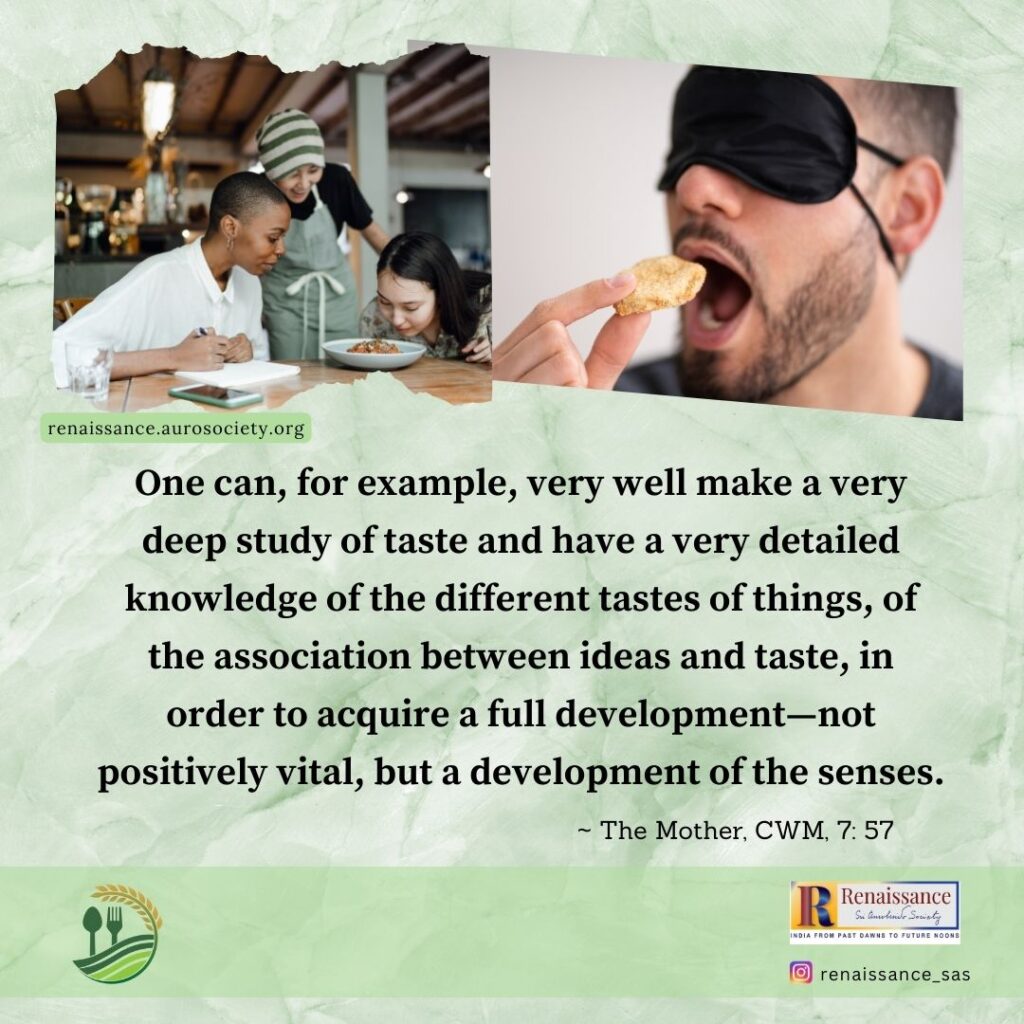
Have you ever wondered how and why did the taste for food develop? How can one refine and develop one’s sense of taste? We feature a relevant conversation of the Mother with some disciples under the title – Refining the Sense of Taste with No Attachment to Food.
In the feature titled The What and Why of Sattwic Food, we highlight what Sri Aurobindo wrote in response to some queries about the kinds of food that a spiritual aspirant should avoid. For the ‘Book of the Month‘ we highlight a delightful passage from Nirodbaran’s magnificent ‘Twelve Years with Sri Aurobindo‘. This passage describes Sri Aurobindo’s suppertime.
In the article Food as an Agent of Death, M.P. Pandit explains why in our scriptures it is said that eater eating is eaten or hunger is verily death. Don’t miss an insightful comment from Sri Aurobindo at the conclusion of this feature!
We begin the section on Sleep with a few letters of Sri Aurobindo. He emphasizes the importance of sufficient sleep for a normal healthy life as well as for one’s sadhana. Insufficient sleep weakens the nervous envelope and leads to tamas.
How to experience real rest is the title of a feature which helps us discover that true restorative rest one experiences in sleep happens only during a few minutes. That is a sort of Sachchidananda experience, while the rest of the time we travel through various states of consciousness.
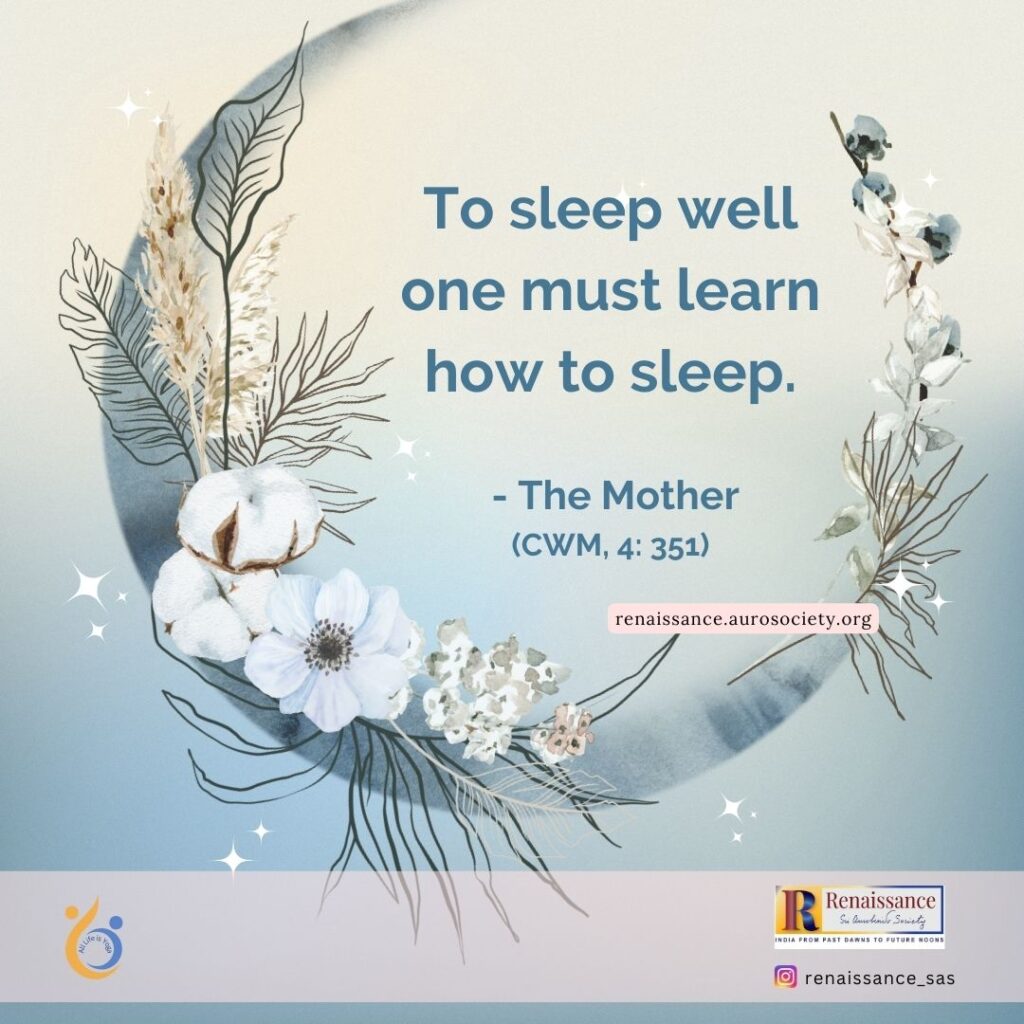
Sri Aurobindo and the Mother tell us that it is possible to prepare oneself to experience a refreshing sleep. In the feature titled Preparing for Conscious Sleep, we learn from Sri Aurobindo that the sleep should be gradually transformed into a conscious sleep. The Mother explains the step-by-step practice to silence the body, vital and mind and enter into higher consciousness during sleep.
In the feature titled On Nightmares, Dreams and Guru’s Protection, the Mother explains that dreams are the fields of discovery where both the outer influences and one’s own formations can cause attacks. She advises to hold a perfect indifference, quietude and faith within oneself and also call for the Guru’s protection during sleep.
Is there something like metaphysical food and sleep? Our regular contributor, Narendra Murty, who is now a full-time volunteer with Renaissance, makes us reflect on these dimensions of food and sleep and offers some valuable insights in the spirit of ‘All Life is Yoga.’ Another member of our team, Biswajita Mohpatra debuts on Renaissance with her heartwarming piece titled My Journey with Food.
Related Events
Given that the topic is of wide interest to almost everyone, we are planning two other events to be held at Sri Aurobindo Society in the coming weeks.
Our team has curated a bilingual poster exhibition which will highlight a few insights from Sri Aurobindo and the Mother on conscious eating and cooking. The carefully designed posters in English and Tamil will be on displayed from June 27, 2023 to July 6, 2023, at the Ground Floor Hall of Sri Aurobindo Society.
A small inaugural ceremony will be held at the Ground Floor Hall of Society on June 27, 2023 at 3:30 PM. All are welcome.
Edit: Read a report of the exhibition HERE.
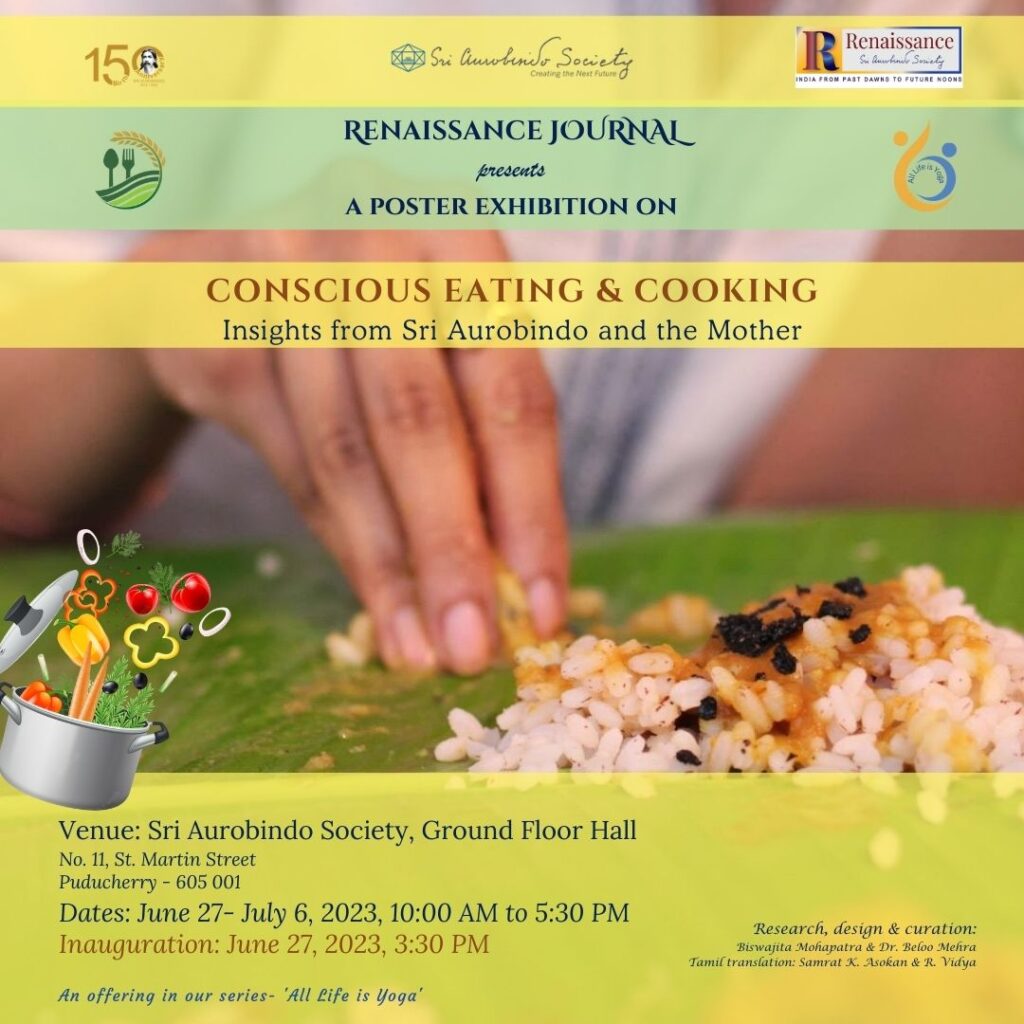
We are also organising a special interactive session on July 6, 2023 with Ms. Deepshikha Reddy. Titled ‘Yoga in Daily Life: Guidance from the Mother (with special emphasis on Conscious Cooking)’ the session will be held at the Board Room, 2nd floor of Sri Aurobindo Society from 4:00 PM to 5:30 PM.
EDIT: Read a report of this event HERE.
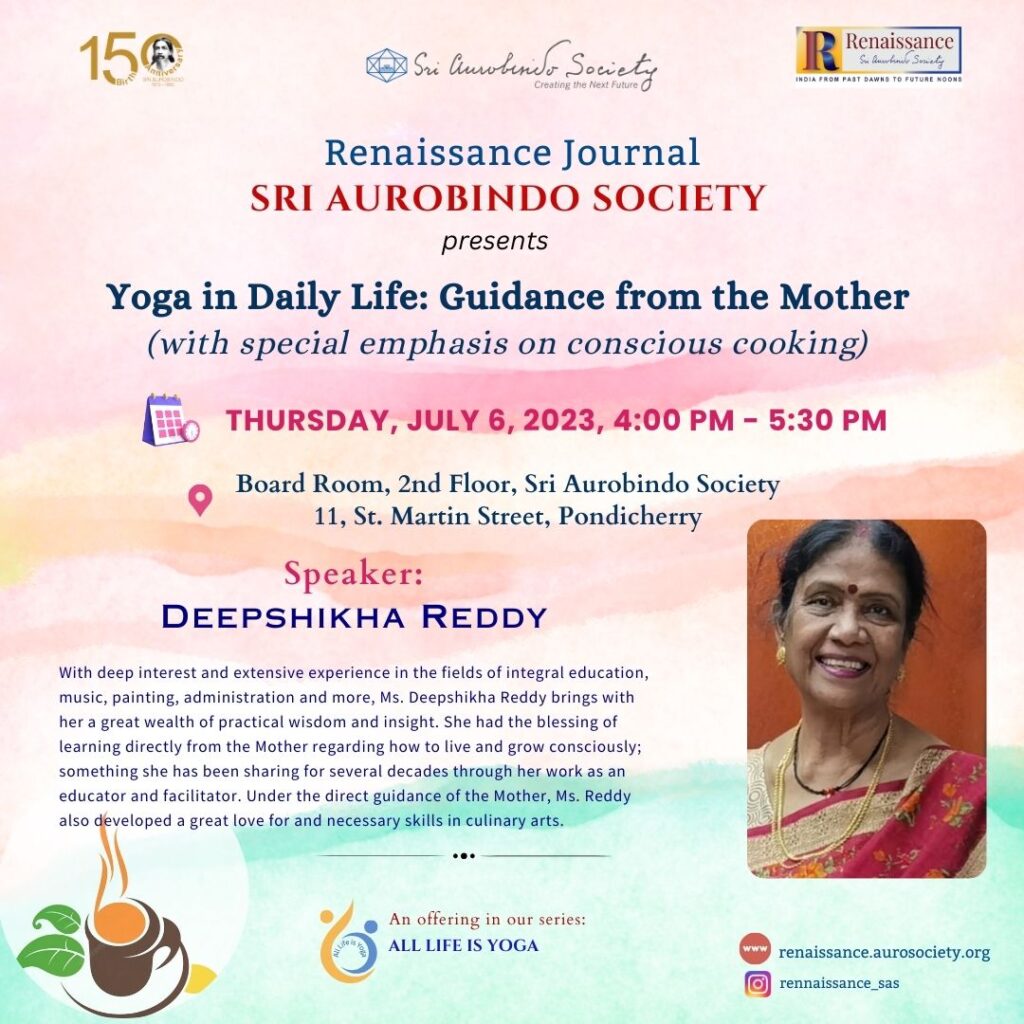
An experiential online session titled ‘Preparing for Conscious Sleep’ will also be organised by the Renaissance team. The aim of this session will be to translate some of the learning from Sri Aurobindo and The Mother on sleep into real daily life practices.
EDIT: Read a report of this event HERE.
***
As always, we offer this work at the lotus feet of Sri Aurobindo and the Mother.
In gratitude,
Beloo Mehra (for Renaissance Editorial Team)

~ Design: Beloo Mehra, Biswajita Mohapatra and Raamkumar



